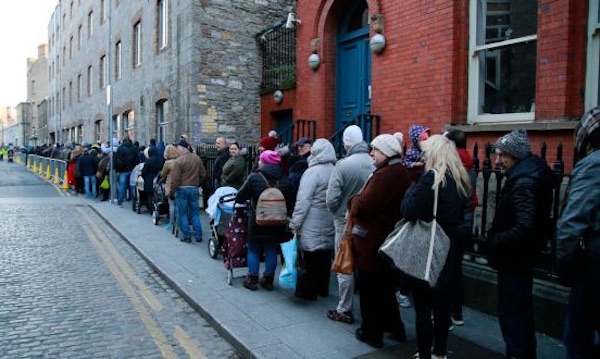
The centenary year of the 1916 Rising ends with new optimism over a campaign of direct action against inequality headed by a motley group of musicians, actors and writers. However, the sight of thousands of people braving the cold to receive food handouts in Dublin and Limerick has highlighted the scale of the challenge.
The ‘Home Sweet Home’ campaign filled a vacuum in Irish society when it launched its high-profile and hugely successful bid to provide accommodation for up to 60 of Dublin’s rough sleepers in one of the thousands of vacant buildings in Dublin.
That campaign was motivated by the failure of politicians to address the scale of deprivation in Ireland which has left thousands homeless. That struck home this week when a crowd of over 3,000 turned up to receive food parcels containing items such as teabags, sugar, milk, bread, and cereals, as well as portions of chicken, bacon, and sausages.
Hundreds had to be turned away from a similar event run by the St Vincent de Paul charity in Limerick after supplies of 6,000 parcels ran out there.
The crowds were made up of men and women of all ages, as well as struggling families with small children. Pictures of the queues for food were published in the Irish media and recalled the worst days of Irish workhouses and soup-kitchens.
“It’s shocking that this is what we see in 2016 at a time when we are being told that the recession is over. If it is, we are not seeing it”, said Brother Kevin Crowley of the Capuchin Day Centre, who manages the anti-poverty campaign in Dublin. “It’s really just par for the course for what we expect to see now.”
Brother Crowley, who has run the centre since 1974 and is unconnected to ‘Home Sweet Home’ campaign, said it was appalling that, in 2016, thousands of children were being forced to live in temporary accommodation without any facilities.
He said 50 to 60 families visit the centre every week to get baby food and nappies.
“No child should be living in those circumstances,” he said. “A child came up to me recently and said: ‘Brother Kevin, how will Santa know where I am if I am living in a hotel?’
“The government needs to wake up to this and stop talking about things coming on stream in a few years. Where are people going to live now? The protection of children is paramount to us. No child should be going hungry. It’s appalling what’s going on.”
One man in the line said he recently fell on hard times and has been living between hostels in Dublin. “Without them here we would starve,” he said. “It is very hard to feed yourself, after I pay for the hostel I only have 40 euro left for the week. Without the Capuchins I don’t know what I would do.”
Homeless campaigner Fr Peter McVerry, who has worked on homeless issues in Ireland since 1974, said, “We have more homeless people today in Ireland than at any time since the Famine. And the reasons for people becoming homeless are much the same as during the Famine.
“They are being evicted from their private rented accommodation because they can’t afford to pay their rents.
“During the Famine it was foreign landlords, English landlords, who were evicting Irish tenants. Today it is increasingly vulture funds, foreign landlords, evicting Irish tenants.
“We have come right back to the 1860s and yet we are the 14th wealthiest country in the world.
“Something has seriously, seriously gone wrong. The whole economy is focused on money, money, money and greed, greed, greed and creating wealth. People have been left out and forgotten.”
A MUSICAL BREAKTHROUGH
However, there are signs of a new public awareness and a determination to bring about radical change.
Last week a group of musicians and other artists, in tandem with trade unionist Brendan Ogle, energised swathes of Irish society with one well organised and well funded direct action. Home Sweet Home volunteers, the Irish Housing Network and others occupied Apollo House, an empty building due for demolition on Tara Street in Dublin.
They began moving in homeless people, and worked to build beds and bedrooms, to provide running water and electricity. In extraordinary scenes, they held impromptu gigs to build support, raise funds and create an atmosphere of solidarity and hope in Dublin city centre.
The building is owned by the state-run NAMA bank for dealing with the 2008 financial crisis caused by the collapse in property prices. This week, a legal bid by the receivers to evict the homeless residents failed, but only in the short term. The High Court has ruled that the building must be vacated with a stay on the order until January 11th.
A second NAMA property in Sligo has also been occupied, and there are signs that a new wave of activists has been motivated to build the movement needed to directly tackle the housing and homelessness crisis.
In a memorable speech, film director Terry McMahon this week lent his support. He described the Apollo House occupation as “one single action that might, in the Centenary of 1916, make us feel like we haven’t entirely lost our spirit.”
That action had highlighted the cold severity of austerity and poverty in our society, he said: “This was an act of defiance as much as an act of humanity.”
In a powerful address at an event in the Axis Theatre, Dublin, McMahon battled to keep his voice steady as he spoke about “our Ireland” where we have “failed miserably”.
“Where the census office can report a quarter of a million empty properties and the homeless can fuck off and die.”
McMahon added: “That night the NAMA building was taken and something magical was born -- That magic took an absurd ambition and reminded us that this is our Ireland. Not the government’s, not the banks’”.
![[Irish Republican News]](https://republican-news.org/graphics/title_gifs/rn.gif)
![[Irish Republican News]](https://republican-news.org/graphics/title_gifs/harp.gif)

